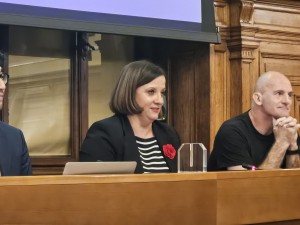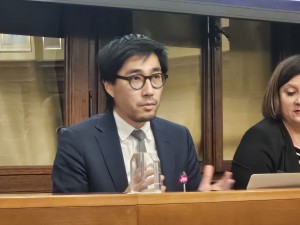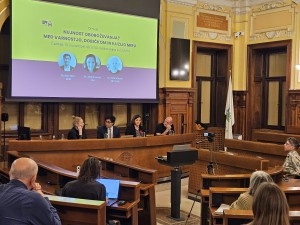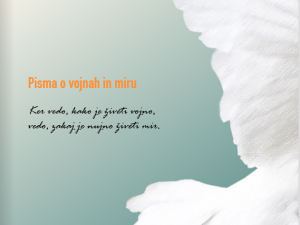Living Peace 24: Letters of Wars and Peace
27. 6. 2025 | Politics
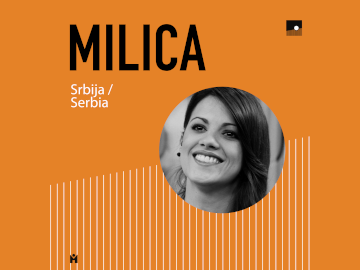
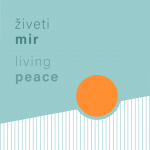 At the end of 2022, we at the Peace Institute, started organizing a series of public events entitled Thinking Peace as a response to the multitude of armed conflicts around the world. Since the world has been spiralling into dangerous global militarization, we wanted to rethink what is war, what is peace, and more importantly how to ensure a stable peace which would not be quickly engulfed in new conflicts and wars.
At the end of 2022, we at the Peace Institute, started organizing a series of public events entitled Thinking Peace as a response to the multitude of armed conflicts around the world. Since the world has been spiralling into dangerous global militarization, we wanted to rethink what is war, what is peace, and more importantly how to ensure a stable peace which would not be quickly engulfed in new conflicts and wars.
We want to expand on the Thinking Peace cycle and add new dimensions to imagining peace. With the help of amazing individuals worldwide, we are beginning a new series of public letters written by people whose lives were interrupted by war or who found themselves in a recent armed conflict. We have titled this series of letters as Living Peace to emphasize how important peace is and that people often only realize this importance when facing the brutality of war. We want to illustrate how people from Palestine, Ukraine, Rwanda, Bosnia and Herzegovina, Croatia, Serbia, Syria, Sudan, Afghanistan, Congo, Yemen and elsewhere think publicly about peace. How do the inhabitants of these regions face wars and military conflicts? What lessons can we learn from their intimate experiences and existential fears?
While opinions of world leaders who justify or even defend wars, dominate today’s media spheres, we want to amplify the voices that defend peace, reject violence and recognize equal rights for all. Having experienced war, they understand why it is essential to live in peace.
The 24th letter we are publishing was written by Milica from Serbia:
While experiencing migration you carry all kinds of small wars and struggles with you, even if you move from a completely lawful country (does that even exist?) to another, let alone when you move from a country with ongoing rioting. There is no war in Serbia, but at every moment of my life – and yours – wars with weapons, under falling bombs were fought in some part of the world. Unfortunately, my part of the world was also at war, more than once. Ok, I was young, I forgot – someone would say. Yes, I forgot, but – in poetic terms – “the body remembers”. There is no war in Serbia, but there is rioting. In Serbia, even after the war, there is no peace.
***
Let me point out that students in the Republic of Serbia are not the reason for the unrest, they are the generation that will save us from the unrest in which present generations live. But will that peace even be mine if I no longer live in Serbia? When you move from your country and you come to live in another one, everything is doubled, joy and sadness and unrest and worry. To live in peace, I need peace in both the old and the new country. I also need to achieve my own internal peace, which is the most difficult to attain, especially as an immigrant. Peace does not come by itself, saying it with an oxymoron, you fight for peace. And as I believe you do not fight that fight with weapons, but with incorruptibility, perseverance, solidarity and love.
Letter by Milica from Serbia
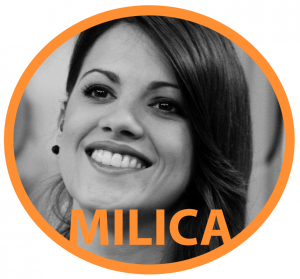 The most beautiful and the most difficult living experience, and we can also call it a temporary identity, is being a migrant. It is nice, because it brings a new home – streets, people, friends, language, apartment, music, cinema, culture, diversity, learning, love. It is difficult because: administrative unit, longing, money, language, people, discrimination, not belonging.
The most beautiful and the most difficult living experience, and we can also call it a temporary identity, is being a migrant. It is nice, because it brings a new home – streets, people, friends, language, apartment, music, cinema, culture, diversity, learning, love. It is difficult because: administrative unit, longing, money, language, people, discrimination, not belonging.
While experiencing migration you carry all kinds of small wars and struggles with you, even if you move from a completely lawful country (does that even exist?) to another, let alone when you move from a country with ongoing rioting. There is no war in Serbia, but at every moment of my life – and yours – wars with weapons, under falling bombs were fought in some part of the world. Unfortunately, my part of the world was also at war, more than once. Ok, I was young, I forgot – someone would say. Yes, I forgot, but – in poetic terms – “the body remembers”. There is no war in Serbia, but there is rioting. In Serbia, even after the war, there is no peace.
In Serbia I have never lived in peace. I have never reached my inner peace, which I persistently hope for, nor did I reach that social peace, in the form of an undivided society, the rule of law, optimism, hope and non-conflict. There has never been such a peace, and there was constant unrest even before the masses came to the streets. And the people in Serbia have been on the streets since 2016, sporadically, and for more than three months there have been unprecedented protests and actions of civil disobedience in Serbia. In the name of peace, they block the streets, they don’t go to classes but sabotage them, they protest in front of the health institutions where they work, they drive tractors on the asphalt, they walk for days, and all this really in the name of peace – to finally change the system that is falling apart from strife, nepotism, corruption, injustice, persecution and hatred.
As a journalist who worked for 12 years in Serbia at the Public Service Television of Vojvodina, which during all that time really worked in the interest of the public for not more than two years, I witnessed the decline of the profession and the denigration of the public broadcaster. Since I did not observe this injustice in silence, but in 2016, together with my colleagues, I engaged in the fight to preserve the profession and media freedom, I spent a large part of my journalistic career in rebellion, on a truck, in a protest column, in a clash with my superiors, suffering mobbing which took a toll on my health.
That’s why the decision to move was the correct one.
Let me point out that students in the Republic of Serbia are not the reason for the unrest, they are the generation that will save us from the unrest in which present generations live. But will that peace even be mine if I no longer live in Serbia? When you move from your country and you come to live in another one, everything is doubled, joy and sadness and unrest and worry. To live in peace, I need peace in both the old and the new country. I also need to achieve my own internal peace, which is the most difficult to attain, especially as an immigrant. Peace does not come by itself, saying it with an oxymoron, you fight for peace. And as I believe you do not fight that fight with weapons, but with incorruptibility, perseverance, solidarity and love.
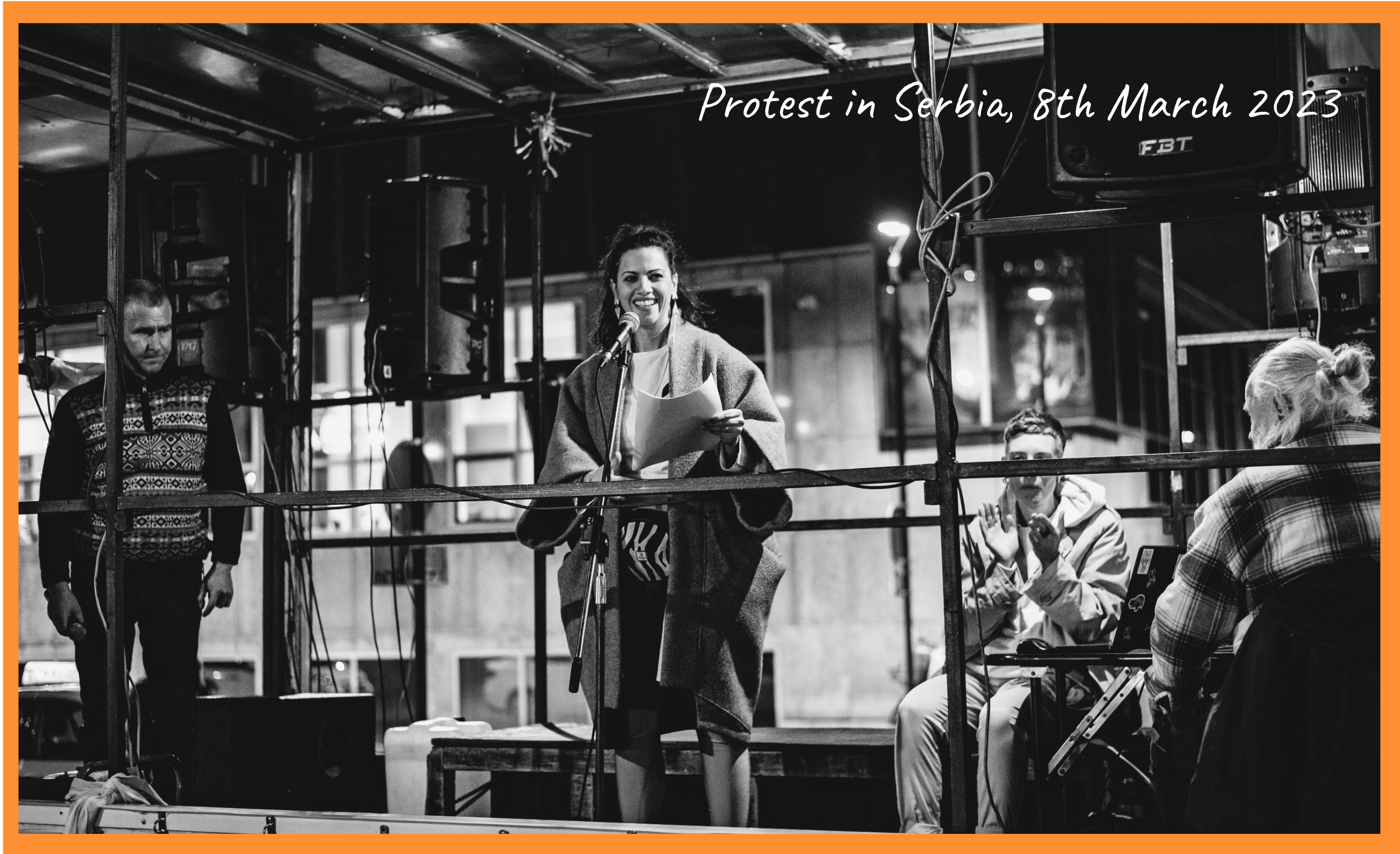
It is what the youth in Serbia have been doing for months, with the support of farmers, professors, doctors, parents, pensioners and all other people, might become a recipe that we can apply internationally. I think that this is already happening. True, this internationalism is mostly limited to Balkans because for months the support for Serbia has been coming from the streets of Ljubljana, Maribor, Rijeka, Zagreb, Sarajevo. But it has also come from Vienna, Amsterdam, Thessaloniki and other cities. Only peoples’ solidarity and common resistance to autocracy can save this world.
Ljubljana is a city that I love, among other things, because ever since I have been living here, there have been regular protests against the war in Palestine, for the rights of women and workers, and in recent months the protests in support of students in Serbia. I’m not sure how effective these protests are but voicing a stance like that is the least we can do in the name of peace, because peace can never exist in isolation. Until we are all free, no one is free.

